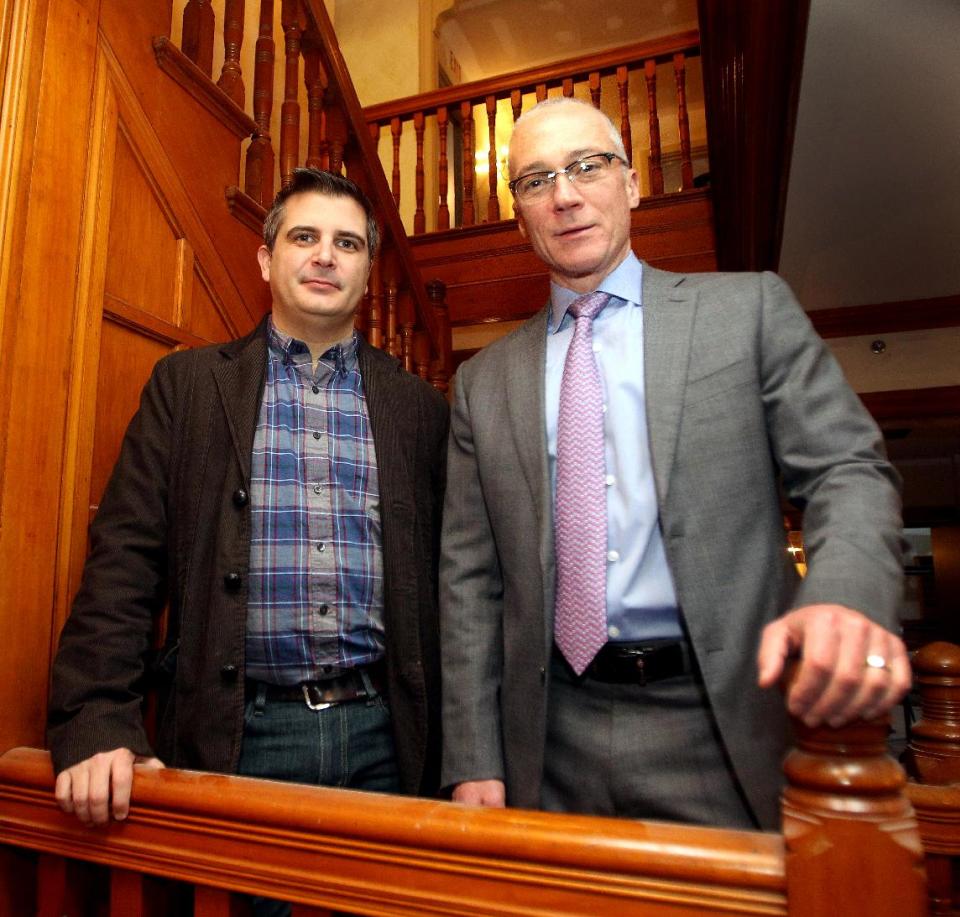
MANCHESTER, N.H. (AP) — Dan Innis' husband persuaded him to run for the U.S. House.
It didn't matter that Innis, a former business school dean, faced an aggressive Democratic incumbent, GOP colleagues who oppose his right to marry, and history — no Republican ever has been openly gay when first elected to Congress.
"He said, 'You've got to do this,'" recalls Innis, running in the 1st Congressional District, which covers most of eastern New Hampshire. "He said, 'You need to take this opportunity and see if you can make a difference.'"
Innis plays down his sexuality as a campaign issue, but acknowledges the historic undertones. He is among three openly gay Republicans nationwide expected to run in this year's midterm elections. None has an easy path to Washington.
Each ultimately must unseat a Democratic incumbent, overcome brushes with hate and confront passionate divisions within the GOP about the way they live their lives. The Republican Party is trying to soften its tone on divisive social issues, but many religious conservatives see homosexuality as immoral.
Innis is married to a man, as is former state Sen. Richard Tisei, R-Mass., who is expected to run again for the northeastern Massachusetts congressional seat he narrowly lost in 2012 to Democratic Rep. John Tierney.
In San Diego, former Republican city councilman Carl DeMaio is challenging first-term Democratic Rep. Scott Peters.
"You can't focus on any of the nasty comments or attacks — not just from far right, also from far left," DeMaio says.
During his unsuccessful 2012 Republican mayoral campaign, DeMaio and his male partner of six years were booed as they walked hand in hand in San Diego's gay pride parade.
"Every once in a while we'll get some hate that is truly over the top — a truly venomous voice mail message. Every time we need a lift-me-up, we play it and chuckle," DeMaio says. "It's just a reminder that what we're fighting for matters."
He is fighting his own party, too.
The GOP's formal platform, as set in its 2012 national convention, declares that "marriage, the union of one man and one woman, must be upheld as the national standard."
Republican opposition to gay marriage has become less visible recently as the GOP works to improve its image and polling suggests that most Americans support same-sex marriage.
Prominent social conservatives such as former Pennsylvania Sen. Rick Santorum and Ralph Reed, former leader of the Christian Coalition, declined to be interviewed for this story.
As a senator in 2003, Santorum, a leading candidate in the 2012 presidential primary, compared homosexual acts to child molestation and bestiality.
Last month, U.S. Rep. Randy Forbes, R-Va., drew national attention for pressuring the House Republican campaign arm not to support openly gay candidates. That led House Speaker John Boehner, R-Ohio, to pledge public support for gay Republicans.
Boehner traveled to Massachusetts in 2012 to help raise money for Tisei, who notes that more than 70 members of Congress supported his last campaign.
Still, Tisei says the GOP must do more to change the perception that "we're the party that wants to deny people their rights and interfere with their personal lives."
In particular, he says Republicans need gay members in their ranks to help shift their mindset on key policies. "It would be a lot harder to take positions that discriminate against people when you have (gay) people in the room you work with on a daily basis that you like and know," Tisei says.
Democrats currently have eight openly gay members serving in Congress, including Wisconsin Sen. Tammy Baldwin, who last year became the nation's first openly gay senator.
There have been no openly gay Republicans in Congress since Rep. Jim Kolbe of Arizona retired in 2006. First elected in 1984, Kolbe didn't disclose his sexual orientation until 1996.
Rep. Steve Gunderson of Wisconsin served more than a decade before a Republican colleague publicly disclosed Gunderson's sexual orientation on the House floor in 1994. Gunderson did not seek re-election in 1996.
In the 2014 election, the number of openly gay House candidates overwhelmingly favors Democrats, according to a list compiled by the Gay & Lesbian Victory Fund, which works to elect gay candidates at all levels. Of 14 openly gay candidates expected to run, 11 are Democrats, including six incumbents and high-profile challenger Sean Eldridge of New York, the husband of Facebook co-founder Chris Hughes.
Considered top-tier challengers, Tisei and DeMaio recently teamed up to raise money in joint appearances across the country for a newly formed political action committee known as the Equality Leadership Fund. Last month, they traveled to Washington, New York and Florida and expect another tour in the spring.
In New Hampshire, Innis is trying to unseat Democratic incumbent Carol Shea-Porter. But he must first survive a Republican primary contest against Frank Guinta, a former congressman unseated in the last election. With long ties to the business community, Innis is expected to have strong financial backing in an election he says will be decided on fiscal issues.
"The best history we could make would be moving the budget toward balance and getting ourselves to a position where we could invest in our future again," he says.
New Hampshire GOP strategist Jamie Burnett says he doesn't know whether candidates' sexual orientation helps or hurts their electoral prospects.
"Some social conservatives might object, but many Republicans might not care at all and perhaps see it as softening the party's image," he says. "This is unchartered territory in recent New Hampshire Republican politics."

No comments:
Post a Comment